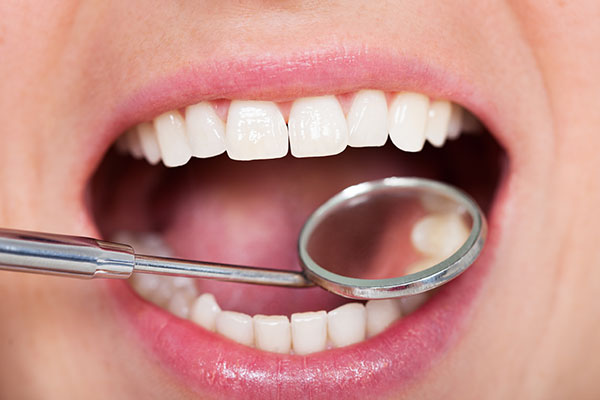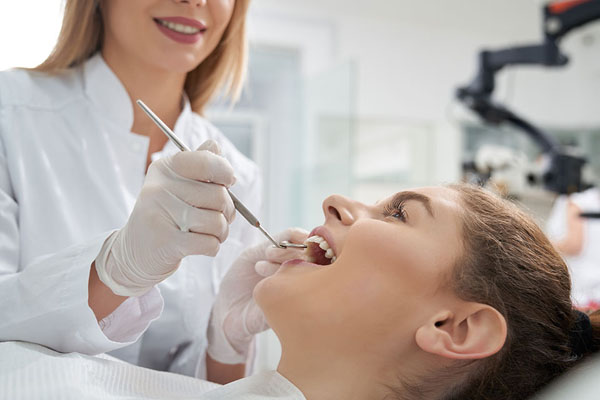Are You Dealing with Dry Mouth? Learn More from Our Ashland Dentist

If you’re looking for a new dentist in Ashland, contact our dental office near you today by calling (541) 482-7771.
What Is Dry Mouth and Why Does It Matter?
Dry mouth is more than just an inconvenience—it can significantly affect your quality of life and oral health. Saliva plays a critical role in keeping your mouth healthy by:
- Neutralizing acids produced by bacteria, which helps prevent tooth decay.
- Washing away food particles and debris to keep your mouth clean.
- Aiding digestion by breaking down food and making it easier to swallow.
- Protecting your teeth by providing minerals like calcium and phosphate to strengthen enamel.
When saliva production decreases, you may experience symptoms such as:
- A sticky, dry feeling in your mouth or throat
- Difficulty chewing, swallowing, or speaking
- A burning sensation or sore throat
- Bad breath (halitosis)
- Cracked lips or sores in the mouth
- Changes in taste or a metallic taste
Common Causes of Dry Mouth
Medications
Many prescription and over-the-counter medications list dry mouth as a side effect. These include antihistamines, antidepressants, diuretics, and medications for high blood pressure or anxiety.
Medical Conditions
Certain health conditions, such as diabetes, Sjögren’s syndrome, rheumatoid arthritis, or Parkinson’s disease, can reduce saliva production. Autoimmune disorders and radiation therapy for head and neck cancers can also damage salivary glands.
Dehydration
Not drinking enough water or excessive sweating can lead to temporary dry mouth. Dehydration is often caused by hot weather, intense exercise, or illness.
Lifestyle Factors
Smoking, chewing tobacco, or excessive alcohol or caffeine consumption can dry out your mouth. Mouth breathing, often caused by nasal congestion, can also contribute.
Aging
While aging itself doesn’t cause dry mouth, older adults are more likely to take medications or have medical conditions that lead to xerostomia.
By identifying the cause of your dry mouth, you and our dentist in Ashland can develop a personalized plan to address it. Call (541) 482-7771.
Our Top Tips for Preventing Dry Mouth
 Stay Hydrated Throughout the Day
Stay Hydrated Throughout the Day
One of the simplest ways to combat dry mouth is to drink plenty of water. Adequate hydration keeps your salivary glands functioning properly and helps wash away food particles and bacteria.
- Tip: Aim to drink at least eight 8-ounce glasses of water daily (about 2 liters). Carry a reusable water bottle to sip water throughout the day. You can even add a slice of lemon or cucumber to your water for flavor, but avoid sugary drinks or acidic beverages like soda, which can harm your teeth.
Chew Sugar-Free Gum or Suck on Sugar-Free Candies
Chewing gum or sucking on candies stimulates saliva production, which can relieve dry mouth symptoms. Opt for sugar-free products to avoid cavities.
- Tip: Look for products containing xylitol, a natural sweetener that has been shown to reduce the risk of tooth decay by inhibiting bacterial growth.
Limit Caffeine and Alcohol
Caffeine and alcohol are diuretics, meaning they can dehydrate you and worsen dry mouth symptoms. Reducing your intake of coffee, tea, energy drinks, and alcoholic beverages can help.
- Tip: Replace caffeinated or alcoholic drinks with water, herbal teas, or non-acidic juices. If you can’t give up your morning coffee, drink it through a straw to minimize contact with your teeth and follow it with a glass of water.
Avoid Smoking and Tobacco Products
Smoking and chewing tobacco not only dry out your mouth but also increase your risk of gum disease, oral cancer, and other dental problems.
- Tip: If you’re struggling to quit, talk to our dentist or your doctor about smoking cessation programs or resources.
Use a Humidifier at Night
Dry air, especially in winter or in air-conditioned rooms, can exacerbate dry mouth, particularly if you breathe through your mouth while sleeping.
- Tip: Place a humidifier in your bedroom to add moisture to the air. Clean it regularly to prevent mold or bacterial buildup. Consider a cool-mist humidifier for year-round use, and add a few drops of essential oils like eucalyptus for a soothing effect (if safe for you).
Practice Excellent Oral Hygiene
Good oral hygiene is critical for preventing complications from dry mouth, such as cavities and gum disease. Without enough saliva to wash away bacteria, your teeth and gums are more vulnerable.
- Tip: Brush your teeth at least twice a day with fluoride toothpaste and floss daily to remove plaque and food particles. Use a soft-bristled toothbrush to avoid irritating your gums, and consider an electric toothbrush for more effective cleaning.
Choose the Right Mouthwash
Some mouthwashes contain alcohol, which can dry out your mouth further. Opt for an alcohol-free mouthwash designed for dry mouth relief.
- Tip: Look for products labeled “dry mouth formula” or those containing ingredients like aloe vera or glycerin to soothe oral tissues.
Eat a Balanced Diet
Certain foods can help stimulate saliva production, while others can worsen dry mouth. Incorporate saliva-friendly foods into your diet and avoid those that dry out your mouth.
- Tip: Eat crunchy fruits and vegetables like apples, carrots, and celery, which naturally stimulate saliva and clean your teeth.
Visit Our Ashland Dentist Regularly

- Tip: Schedule dental visits every six months or as recommended by our dentist near you. Call (541) 482-7771 today.
When to Seek Professional Help
While these tips can help manage mild to moderate dry mouth, persistent or severe symptoms may require professional intervention. Contact our dentist or your doctor if you experience:
- Chronic dry mouth that doesn’t improve with lifestyle changes
- Difficulty swallowing or speaking
- Frequent oral infections or sores
- Persistent bad breath despite good oral hygiene
- Signs of tooth decay or gum disease, such as tooth sensitivity or bleeding gums
Take Control of Your Oral Health Today!
Dry mouth is a manageable condition with the right strategies and professional support. At Today’s Dentistry, we’re committed to helping you achieve a healthy, comfortable smile. If you’re experiencing dry mouth or have concerns about your oral health, schedule an appointment with our experienced dental team today. Call our Ashland dentist near you at (541) 482-7771.

 Stay Hydrated Throughout the Day
Stay Hydrated Throughout the Day